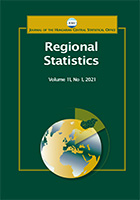Assessing the health system efficiency by using avoidable mortality indicators in European countries, 2019
Assessing the health system efficiency by using avoidable mortality indicators in European countries, 2019
Author(s): Pavla Jindrová, Hana BoháčováSubject(s): Social Sciences, Economy, Geography, Regional studies
Published by: Központi Statisztikai Hivatal
Keywords: efficiency of the health care system; avoidable mortality; health inequality; cluster analysis; multidimensional comparison
Summary/Abstract: An efficient health care system is a priority for all developed countries, and it is an important prerequisite for economic prosperity. Efficiency is measured by the ratio of inputs to outputs of a given system. In the case of health care, inputs include health care expenditure and human and material resources. There are several outputs that can be used to assess efficiency. Among the most important and frequently used are avoidable mortality rates. The consequences of avoidable mortality are understandably very unpleasant for those involved. From a national perspective, avoidable mortality also has serious macroeconomic consequences. The aim of this paper is to assess the efficiency of the health care systems of the member states of the European Union using avoidable mortality rates. Data were taken from the latest available online datasets on avoidable mortality published by Eurostat in 2019. Correlation analysis and multivariate statistical analysis were used.
Journal: Regional Statistics
- Issue Year: 13/2023
- Issue No: 06
- Page Range: 1124-1144
- Page Count: 21
- Language: English

